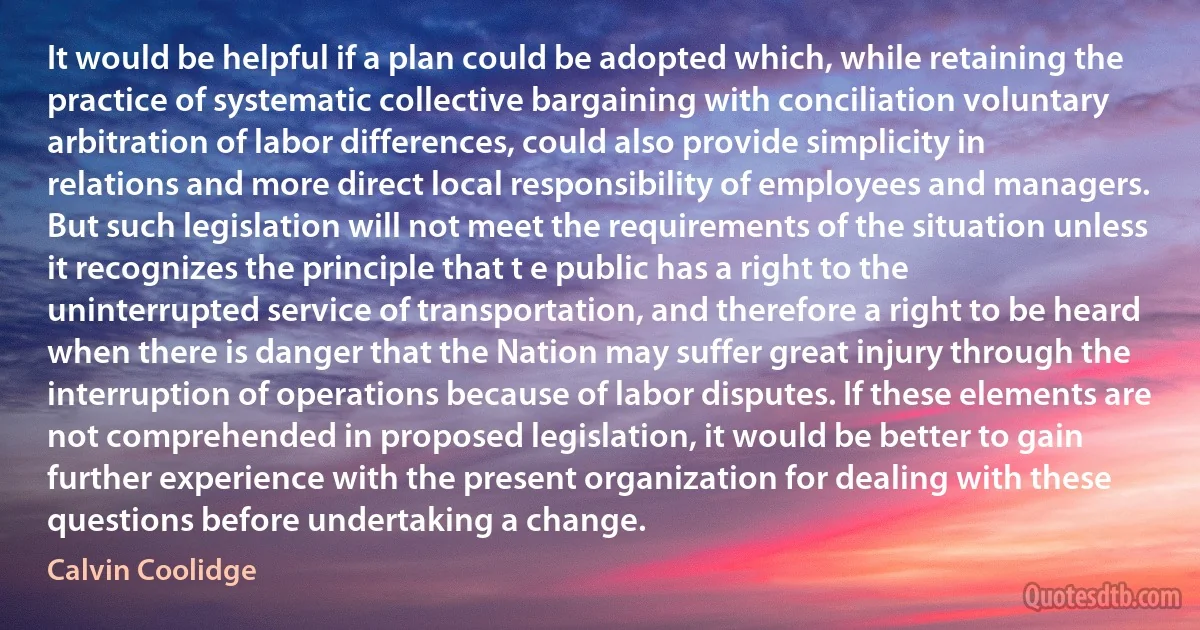
It would be helpful if a plan could be adopted which, while retaining the practice of systematic collective bargaining with conciliation voluntary arbitration of labor differences, could also provide simplicity in relations and more direct local responsibility of employees and managers. But such legislation will not meet the requirements of the situation unless it recognizes the principle that t e public has a right to the uninterrupted service of transportation, and therefore a right to be heard when there is danger that the Nation may suffer great injury through the interruption of operations because of labor disputes. If these elements are not comprehended in proposed legislation, it would be better to gain further experience with the present organization for dealing with these questions before undertaking a change.
Calvin CoolidgeRelated topics
arbitration bargaining change conciliation danger experience gain great injury interruption labor legislation meet nation organization plan practice present public retaining right service situation transportation while relations questions operationsRelated quotes
Clearly the present organization of the scientific community, cutting across the lines of nation states, bureaus, and almost all previously existing institutions, cannot be the result of conscious planning. There is, today, a good deal of organizational planning, but all of the instrumentalities which engage in this activity were founded after the development of science was well under way. Further, most of these organizations are parochial in nature, concerning themselves with only some special part of the scientific community like mathematical biophysics or Russian science. There is no general institution which has shaped or now can shape the development of science, only a mass of institutions which provide little more than liaison (and sometimes funds) for the scientific "producers.”.

Gordon Tullock
THEY who are acquainted with the present state of the theory of Symbolical Algebra, are aware, that the validity of the processes of analysis does not depend upon the interpretation of the symbols which are employed, but solely upon the laws of their combination. Every system of interpretation which does not affect the truth of the relations supposed, is equally admissible, and it is thus that the same process may, under one scheme of interpretation, represent the solution of a question on the properties of numbers, under another, that of a geometrical problem, and under a third, that of a problem of dynamics or optics. This principle is indeed of fundamental importance; and it may with safety be affirmed, that the recent advances of pure analysis have been much assisted by the influence which it has exerted in directing the current of investigation.

George Boole
Another feature to which I will allude is that the new constitution provides that cabinet ministers and heads of departments may have the privilege of seats upon the floor of the Senate and House of Representatives and may have the right to participate in the debates and discussions upon the various subjects of administration. I should have preferred that this provision should have gone further, and required the President to select his constitutional advisers from the Senate and House of Representatives. That would have conformed entirely to the practice in the British Parliament, which, in my judgment, is one of the wisest provisions in the British constitution. It is the only feature that saves that government. It is that which gives it stability in its facility to change its administration. Ours, as it is, is a great approximation to the right principle.

Alexander H. Stephens
What is the alternative to collective bargaining? There is none except anarchy, and there are rare elements in the country that would like to see anarchy in the trade unions-in my view the most dangerous thing for the country that could happen. Another alternative is force, but we may rule out force in this country, and I would lay it down that, so long as the industrial system remains as it is, collective bargaining is the right thing. I have no doubt about that. And yet we all know in our heart of hearts that it may be a clumsy method of settling disputes, and that the last word has not been spoken. Some day, when we are all fit for a democracy, we shall not need these aids, but certainly for my part, and as long as I can see ahead, unless there is that change in human nature which we are always hoping for, collective bargaining will be a necessity.

Stanley Baldwin
In spite of all the foregoing, there is a science of economics, a true, and even exact, science, which reaches laws as universal as those of mathematics and mechanics. The greatest need for the development of economics as a growing body of thought and practice is an adequate appreciation of the meaning, and the limitations, of this body of accurate premises and rigorously established conclusions. It comes about in the same general way as all science, except perhaps in a higher degree, i. e., through abstraction. There are no laws regarding the content of economic behavior, but there are laws universally valid as to its form. There is an abstract rationale of all conduct which is rational at alt, and a rationale of all social relations arising through the organization of rational activity.

Frank Knight
